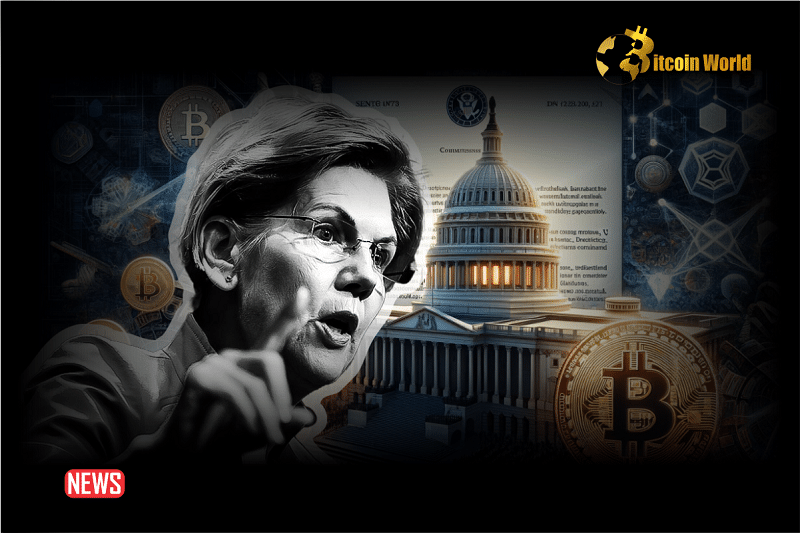The crypto world cheered when the SEC finally gave the green light to Spot Bitcoin ETFs. But not everyone’s celebrating. US Senator Elizabeth Warren, a long-time crypto skeptic, has voiced strong disapproval of the SEC’s decision. Why is she concerned, and what does this mean for the future of Bitcoin and crypto regulation? Let’s dive into Warren’s critique and the ongoing debate.
Warren’s Warning: Are Spot Bitcoin ETFs Rushing Crypto into Mainstream Finance Too Fast?
Senator Elizabeth Warren didn’t hold back in her criticism of the Securities and Exchange Commission’s (SEC) recent move. She openly questioned the wisdom of allowing Spot Bitcoin ETFs, expressing apprehension about the increasing entanglement of cryptocurrencies with traditional finance. Her core message? We need stronger guardrails, especially when it comes to anti-money laundering and broader crypto regulation.
- Concern over Crypto Integration: Warren worries that Spot Bitcoin ETFs are a step towards weaving crypto too tightly into the everyday financial system.
- Call for Stricter Rules: She insists on the urgent need for robust anti-money laundering (AML) regulations to keep pace with this integration.
- Highlighting Crypto Risks: Despite the market excitement and Bitcoin’s price jump, Warren remains cautious, pointing to the well-known risks of digital theft and the use of crypto for illicit activities.
In essence, Warren believes the SEC might have jumped the gun, potentially overlooking crucial legal and policy considerations in their eagerness to approve these ETFs.
See Also: Cardano (ADA) Surged In Price Following The Bitcoin ETF Approval
Spot Bitcoin ETFs: A Milestone or a Misstep?
January 10th, 2024, marked a pivotal moment for the crypto industry. The SEC, after years of hesitation, finally approved applications for Spot Bitcoin ETFs. This decision is a big deal because it:
- Boosts Bitcoin Accessibility: Makes it easier for everyday investors to gain exposure to Bitcoin through traditional investment channels.
- Sets a Precedent: Opens the door for potential ETFs tied to other major cryptocurrencies like Ethereum and XRP in the future.
The market reaction was largely positive. Bitcoin’s price saw a noticeable surge, and many in the crypto space celebrated this as a sign of growing mainstream acceptance.
Market Mania vs. Regulatory Reality Check
When Spot Bitcoin ETFs started trading on Wednesday, the activity was nothing short of explosive. Eleven asset management firms, including giants like BlackRock and Fidelity, launched their Bitcoin ETFs. The initial trading volume blew past expectations. Bloomberg had projected $4 billion, but the first day saw a remarkable $4.5 billion in trading volume. Within just the first hour, a staggering $1.74 billion worth of ETFs changed hands!
This influx of investment, driven by reputable financial institutions, has drawn in a new wave of investors. BlackRock’s iShares Bitcoin Trust, in particular, has become a closely watched indicator. Bitcoin’s own trading volume jumped nearly 10% in 24 hours, with its price briefly exceeding $48,000 after the market opened.
But amidst this market euphoria, Senator Warren’s voice serves as a reminder of the ongoing regulatory debates. She consistently argues that deeper crypto integration requires a parallel strengthening of regulatory safeguards. Her concerns underscore a fundamental question:
Can Innovation and Regulation Find a Balance in the Crypto World?
Warren’s stance highlights the delicate balancing act between fostering innovation in the financial sector and ensuring consumer protection and overall financial stability. The SEC’s approval of Spot Bitcoin ETFs is undoubtedly a significant step towards mainstream crypto adoption. However, it also amplifies the critical need for clear regulatory frameworks and robust consumer protection measures in the rapidly evolving digital asset landscape.
As the crypto conversation continues to unfold, figures like Senator Elizabeth Warren play a vital role in shaping the future trajectory of financial innovation and regulation. Her skepticism, while perhaps unpopular in some crypto circles, pushes for responsible growth and a more secure financial ecosystem in the age of digital assets.
Disclaimer: The information provided is not trading advice, Bitcoinworld.co.in holds no liability for any investments made based on the information provided on this page. We strongly recommend independent research and/or consultation with a qualified professional before making any investment decisions.


